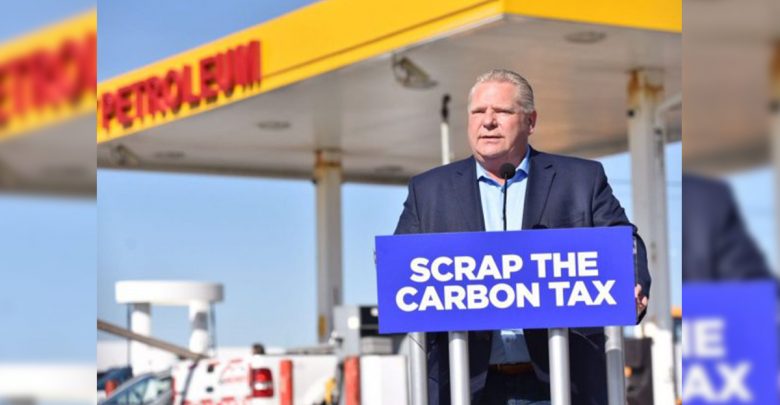 Supplied via zoomerradio.ca
Supplied via zoomerradio.caOntario premier Doug Ford is at it again.
This time, he’s picked a particularly controversial opponent: the federal government’s carbon tax. Since it was announced that all provinces will have a carbon tax thrust upon them come April, the efficacy of carbon taxes has produced praise and criticism from all sides of the political spectrum.
So it’s no wonder Ford felt the need to weigh in on the issue at the Economic Club of Canada. Unfortunately, he’s out of his weight class on this one, seeming to be more than a little confused about what the carbon tax will really mean for Ontario.
Doug Ford’s claim that the carbon tax will result in a recession is based on a report by the Conference Board of Canada, a think tank, called The Cost of a Cleaner Future. Despite what Ford says, the report never mentions the risk of recession due to the carbon tax. It does, however, mention marginal shrinkage in the Canadian economy due to increased production costs and decreased consumption following raised household prices.
The funniest part is that the report is actually pro-carbon levy. The report shows that the direct effect the carbon tax has on reducing greenhouse gas (GHG) emissions is minimal, but “the lion’s share of the drop in emissions… is due to the shift away from using fossil-fuel combustion to generate electricity.” It’s hard to say how Ford managed to misconstrue the intent of this report, but what’s likely is that he saw
According to the World Bank, a carbon tax is capable of reducing GHG emissions without GDP taking a sizable hit. What they cite as proof is none other than our provincial neighbor British Columbia. In the period between 2007, a year before the inception of their carbon tax, and 2016, GHG emissions per person dropped by 2.2 per cent. Furthermore, the use of fossil-fuels throughout BC fell by 16 per cent from 2008 to 2014. This all happened while BC maintained an increasing GDP since 2009.
If Ford had been willing to look beyond his central Canada palace, he may have realized that a carbon tax isn’t the economic disaster he believes it to be.
Believe it or not, Ford doubled down on his claims over Twitter later in the week, saying “the threat of a carbon tax recession is real. The cost of goods that are made, farmed + transported in Ontario will go up with a carbon tax. The price will be paid by Ontarians.”
It seems like Ford realized his mistake and attempted to redefine what he originally meant. This tweet is much closer to the ideas presented in the report he cited, not to mention reality as well. But he still clings to the idea that the slight GDP shrinkage that follows a carbon tax will result in recession.
It’s impossible to say for sure whether or not the carbon levy will benefit the Ontarian or Canadian economies in the long run. What’s very possible to say, however, is that Ford is out of touch with what economic disaster really means. He says that Ontarians will pay dearly for the carbon tax, but until we get expert proof on that, his constituents will continue to pay for his unresearched remarks.




